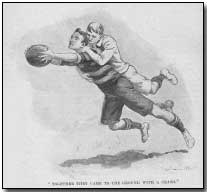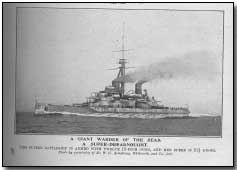Feature Articles - The Most Popular War in History - How Public School Ideals Were Disseminated
 These
schools, then, were a formidable ideological influence of a type which could
easily foster a predisposition for military service. At the same time
though, their products were very insulated from the realities of life at
other levels of society. Let us look now on how their ideals spread to
the rest of the population.
These
schools, then, were a formidable ideological influence of a type which could
easily foster a predisposition for military service. At the same time
though, their products were very insulated from the realities of life at
other levels of society. Let us look now on how their ideals spread to
the rest of the population.
To begin with, there was their immense prestige. Their products formed most of Britain's ruling class, so naturally their values gained pre-eminence. They also influenced educational practice in the country at large, notably in the grammar schools which although not boarding did develop prefect systems, sixth forms and other Arnoldian features in imitation.
Other channels were even more efficient, for instance the growth of boys' magazines such as Young England and The Boys' Own Paper and The Magnet. These featured characters such as Harry Wharton, Billy Bunter and their chums at Greyfriars (The Magnet), The Fifth Form at St Dominic's (both serialised and published as a single-volume novel), and others.
All these stories, both serials and one-offs, were set in hypothetical public schools and achieved a mass readership. One magazine (Young England for 1912, p237) actually carries a story called For the Good of the Team about schoolboy footballers - the public school games cult (and its moral values) could scarcely be more explicitly promoted! It is headed by a quotation from Tennyson, some of which reads thus:
'Not once or twice in our rough island story
The path of duty was the way to glory
He that walks it, only thirsting
For the right, and learns to deaden
Love of self, before his journey closes...'From Young England for 1912, p237
 The
story itself concerns a boy (Holden) who is pulled back in the nick of time
(a frequent theme) from smoking and other dissipations by his friend
promoted monitor Wantage and who goes on to redeem himself on the football
pitch.
The
story itself concerns a boy (Holden) who is pulled back in the nick of time
(a frequent theme) from smoking and other dissipations by his friend
promoted monitor Wantage and who goes on to redeem himself on the football
pitch.
Holden does so well in fact that Wantage gives up his position as team captain and place in the first team (self-sacrifice, explicitly mentioned in the story and referred to by the Tennyson passage) to allow Holden in. There is also a reference to another boy footballer who begins by acting too much 'solo' but also comes around to the team ideal.
Filling in some spare space at the end of the printed text of the story is a photograph of a new kind of battleship, the 'Super-Dreadnought', fitted with twelve 12-inch guns and described as a 'giant warder of the sea.' (This may be a reference to the Navy's role in safeguarding the far-flung British Empire).
The Royal Navy had a high standing (not for nothing were middle-class small boys often dressed in sailor-suits), and the period immediately before the Great War was a time of intensified naval rivalry with Germany. It serves as an example of a steady background drip of national pride and military glory in these magazines which will be discussed in more detail in the next section.
 For
now, simply observe the juxtaposition of the promotion of the country's
armed forces and an improving, 'manly' tale.
For
now, simply observe the juxtaposition of the promotion of the country's
armed forces and an improving, 'manly' tale.
Both the Super Dreadnought and the Tennyson passage tie the story and its moral into a more general mind-set of duty and patriotism.
Some readers believed that the fictional schools were real, to the extent of writing letters to the magazines asking where they were located and so on. Even at the bottom of English society (as described by Robert Roberts) the stories were read and taken seriously (The Classic Slum p160), although their influence may have been somewhat attenuated.
Themes of these stories included moral regeneration through some chastening experience, accounts of school matches with emphasis on fair play (or the dire consequences of the lack of it) and other more general adventures but usually with some moral content at the back of them.
Next - Moral Certainties
Article and photographs contributed by Humphrey Reader.
Flak was a term used to describe anti-aircraft fire.
- Did you know?
